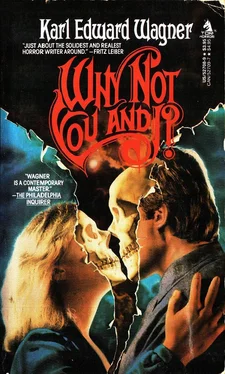Miss von Brocken, 30, was the daughter of an ancient and distinguished Prussian house. She became a naturalized American citizen following the recent move to the political forefront of National-Socialism in Germany. Miss von Brocken, considered herself to have significant clairvoyant abilities, had for several years assisted Dr. Chance in his research. The couple met in Berlin while Dr. Chance was studying there and had traveled extensively. They only recently had returned to Knoxville to announce their engagement.
Funeral arrangements are incomplete.
Moore took another long sip of absinthe, letting its licorice fire blaze through his senses. Yes, incomplete, he thought with a bitter smile. But not for long. He glared at the newspaper photo of Chance, standing big and uncomfortable in dinner dress, with Kirsten on his arm, a poised blonde goddess in her daring black evening gown. God, why had he stayed in Knoxville…
He set aside the tall glass, gripped the knurled knobs of the Luger’s toggle joint in his free hand, pulled back sharply and released — watching the gleam of brass as the 9 mm. cartridge was driven into the firing chamber. Geladen.
Moore recovered his glass and grimly considered the loaded automatic. He remembered the day he had claimed the Luger from the broken body of the Fokker pilot whose triplane he had sent spinning broken-winged to earth on the Allied side. Kill number ten for him. He and Chance had gotten gloriously drunk.
What friends they had been — two idealistic scions of American industrial wealth, off on a lark to destroy the Hun — before the War changed them both. He remembered the shock of their reunion after Chance had crawled through Hell to escape from that German prison hospital. It was a haggard, demon-haunted John Chance who had returned from that ordeal — a driven man, obsessed with half-mad theories and vaguely hinted-at memories of his experiences. Moore in those intervening months had followed his natural talents toward dissipation, and in the whirl of alcohol, drugs, and women was scarcely bothered with the knowledge that for him killing had become the greatest thrill of all.
Strangely, they had not drifted apart entirely after the war. While Chance went from university to university, and Moore squandered his family fortune in the casinos and vice dens of the world, their paths occasionally crossed. So it was in Berlin in 1929.
Moore had been drawn to Berlin by the splendid decadence of that city’s frenzied bacchanalia, where the vices of the old aristocracy and the new intelligentsia promised surcease from even his ennui. Chance had gravitated there in his peripatetic quest from one intellectual center to another, searching for answers that seemed forever hidden. It was Moore who introduced Chance to Kirsten von Brocken.
The Grafin von Brocken had a wide circle of admirers, of whom Compton Moore was perhaps most ardent. She was a spiritualist, a crystal-gazer — whose aristocratic beauty was all the more sensational for the aura of mysticism in which she cloaked herself. Men hovered mothlike about her presence when she appeared at the cabaret or theatre, at Bohemian revels or dinner parties of the social elite. With that hint of notoriety that guaranteed social triumph, the Grafin had conquered Berlin that summer, and to be permitted to attend a séance at her apartment was an honor jealously sought after by the blood and chivalry of the city.
Moore had spent many long summer evenings hovering near the Grafin’s flame. Did she love him? She invited; she retreated — as with all the others. He was certain he was in love with her. All of her admirers, after all, were in love with her — from stolid old General von Hoffmannsthal to that consumptive Austrian artist Meier.
Then a sudden encounter with John Chance, and in a gush of enthusiasm Moore had described Kirsten and invited him along to a séance. Chance went along solemnly skeptical, came away thoughtful and impressed. She and Chance saw more of one another thereafter, soon to the exclusion of Kirsten’s previous admirers — Moore as well.
The summer burned away. Chance was a fascinating man and could speak with calm authority on esoteric and recondite matters wherein he and Kirsten shared interest. Moore never learned who it was that told Kirsten about the Luger and holster where dark stains could still be seen of her brother’s blood.
Eventually frantic telegrams from the States had forced him back to Knoxville to give belated attention to his family investments. The Crash did its work too well for his distracted and incapable management. Enough remained to keep him out of the bread lines, but not much more. Ten years of frenzied dissipation had left him with a legacy of debts and bitter memories. Work was out of the question, assuming employment were available — or that he desired it. Moore was a first-rate combat pilot, but other than his wartime experience the closest he had come to working for a living involved no more physical effort than the clipping of stock coupons.
The contents of his safe deposit vault and the sale of family property had allowed him to drift along for a few years—“a gentleman of the world in reduced circumstances.” From time to time he received a letter from old acquaintances, read an item in the papers — enough to know Kirsten von Brocken and John Chance had not outgrown their fascination for one another. When Chance recently returned to Knoxville with news of their engagement, Moore had not troubled to call upon them.
Well that was all over with now, too. Moore drained the last swallow of the pungent liqueur. He reflected that he had gone on living these last few years solely from inertia anyway — that and the faint hope of the gambler that his luck would change. It hadn’t.
He tossed the empty glass at the living room’s non-operable fireplace. As he raised the Luger to his temple he wondered if the pistol’s former owner would rest more easily in his grave knowing his weapon had at last avenged him.
Moore pulled the trigger.
The blast was deafening in the small room, but he never fully heard it. The high-velocity jacketed slug tore through his right temple, barely expanding as it pulped his brain and blew out the left side of his skull. The Luger recoiled from nerveless fingers, as the shock of the bullet flung him sidewise in the overstuffed chair, sprawling him in a heap on the rug.
From a disembodied vantage he seemed to look down over his corpse — blood and gore matting the thin blond hair, the pale blue eyes staring dreamily at nothing, the aquiline features set in a startled grimace, the long-limbed frame sprawled ludicrously half in and half out of the chair, soaking the red carpet with a darker stain. It looked very little like the alert, rangy young man in aviator’s togs who smiled down from the old photograph on the mantel.
The door swung silently open. Silent as a shadow, a figure entered. A man dressed entirely in black. Unhurriedly he crossed the shabby living room, looked down at the grotesquely sprawled corpse.
“Get up,” the figure commanded.
Compton Moore picked himself up, slumped back in the chair — stared at the figure in fear. “Are you death?” he asked in an awestricken whisper.
“I am Dread.”
Shakily Moore raised a hand to his temple. There was no pain, no blood, no wound. In stunned bewilderment he stared at his uncanny visitor.
The stranger stood well over six feet in height and was clad solely in black from boots to turtleneck jersey. Powerful muscles flexed beneath the close-fitting garments, belying the silver-white of his combed-back hair and trim beard. His features were hidden behind a mask of black metal that concealed the upper portion of his face from high forehead to just below the cheekbone. The featureless metal mask reminded Moore suddenly of the robot’s face in that strange movie he had seen in Berlin— Metropolis. The mouth beneath the mask was thin-lipped, the bearded jaw almost pointed. Through slits in the mask, eyes so dark as to seem almost entirely pupil regarded him with unwavering intensity. Moore thought of a cat’s stare across a darkened room.
Читать дальше












